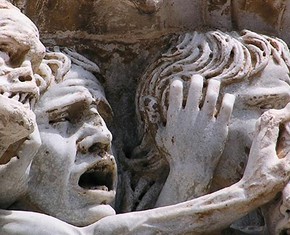The views expressed in our content reflect individual perspectives and do not represent the authoritative views of the Baha'i Faith.
A friend of mine asked me once: “How do you tell a true religion from a false one?” I had to give that one some thought.
I answered her after meditating on the question for a few days, by saying “True religions always call for peace. If someone wants war—an individual, or a denomination, or a nation—that’s false religion. God does not want war.”
My friend loved that definition, but I couldn’t take credit for it. I told her it came from the Baha’i teachings:
… war is destruction while universal peace is construction; war is death while peace is life; war is rapacity and bloodthirstiness while peace is beneficence and humaneness; war is an appurtenance of the world of nature while peace is of the foundation of the religion of God; war is darkness upon darkness while peace is heavenly light; war is the destroyer of the edifice of mankind while peace is the everlasting life of the world of humanity; war is like a devouring wolf while peace is like the angels of heaven; war is the struggle for existence while peace is mutual aid and co-operation among the peoples of the world and the cause of the good-pleasure of the True One in the heavenly realm. – Abdu’l-Baha, Selections from the Writings of Abdu’l-Baha, pp. 296-297.
“Peace,” Abdu’l-Baha wrote, is “the foundation of the religion of God.” While we know that the followers of past religions haven’t always acted peacefully, we also know that the original teachings of most of the world’s great Faiths counseled believers to turn the other cheek; to quell our violent instincts; to walk in peace with all people; to be and do good in the world.
The Baha’i teachings speak directly about universal peace and the way to achieve it throughout the writings of Baha’u’llah and Abdu’l-Baha. In fact, the Baha’i teachings clearly say that Baha’u’llah has brought a new message of peace to the world, emphasizing non-violence, demilitarization and a global system of governance—all in the name of establishing a permanent, universal end to war:
The Sun of Truth hath risen above the horizon of this world and cast down its beams of guidance. Eternal grace is never interrupted, and a fruit of that everlasting grace is universal peace. Rest thou assured that in this era of the spirit, the Kingdom of Peace will raise up its tabernacle on the summits of the world, and the commandments of the Prince of Peace will so dominate the arteries and nerves of every people as to draw into His sheltering shade all the nations on earth. – Ibid., p. 246.
If you search the writings of Baha’u’llah and Abdu’l-Baha, you’ll see that they focused a great deal of attention on peace and its attainment. In October of 1914, for example, after the beginning of World War I, Abdu’l-Baha wrote a powerful antiwar letter to a British Baha’i named Beatrice Irwin in London. An actress, inventor, author, world traveler and renowned poet, Irwin had first written to Abdu’l-Baha about Europe’s descent into armed camps just prior to the initial outbreak of the war in the Balkans.
Abdu’l-Baha opened his now-famous reply to Beatrice Irwin by saying:
O thou beloved daughter! Thy letter was received and I have written for thy sake this Message. This article, in answer to thy question, is very important. Display ye the utmost effort in its publication. – Star of the West, Volume 4, p. 243.
It seems, then, that Abdu’l-Baha thought of his letter to Beatrice Irwin as more than just a letter—instead, he asked her to “display ye the utmost effort” in finding a publisher for his important article.
His article begins this way, with some personal history and a dire warning:
After the declaration of the constitutional regime in Turkey in 1908, by the members of the Committee of the Union and Progress, this prisoner of forty years [Abdu’l-Baha is referring to himself here], travelled and journeyed for three years—from 1910 to 1913—throughout the countries of Europe and the vast continent of America. Notwithstanding advancement in age with its natural consequences, with a resonant voice I delivered detailed addresses before large conventions and in historical churches. I enumerated all those principles contained in the Tablets and Teachings of Baha’u’llah concerning War and Peace.
About fifty years ago, His Holiness Baha’u’llah proclaimed certain Teachings and raised the Song of Universal Peace. In numerous Tablets and sundry Epistles He foretold, in the most explicit language, the present cataclysmic events; stating that the world of humanity was facing the most portentious danger and asserting categorically that the realization of Universal War was unfortunately inevitable and unavoidable. For these combustible materials which were stored in the infernal arsenals of Europe would explode by contact with one spark. Among other things, ’’the Balkans will become a volcano and the map of Europe will be changed.” For these and similar reasons He (Baha’u’llah) invited the world of humanity to Universal Peace. He wrote a number of Epistles to the kings and rulers and in those epistles He explained the destructive evils of war and dwelt on the solid benefits and nobler influences of Universal Peace. War saps the foundation of humanity; killing is an unpardonable crime against God, for man is an edifice built by the Hand of the Almighty. Peace is life incarnate; war is death personified. Peace is the divine spirit; war is satanic suggestion. Peace is the light of the world; war is stygian darkness and cimmerian gloom. AII the great prophets, ancient philosophers and heavenly Books have been the harbingers of Peace and monitors against war and discord. This is the Divine foundation; this is the Celestial outpouring; this is the basis of all religions of God. – Ibid., pp. 243-244.
In the next essay in this short series, we’ll explore Baha’u’llah’s and Abdu’l-Baha’s repeated warnings about a universal war—the first in human history, but not the last.
You May Also Like
Comments

















"The fundamental principle underlying this solemn Pact should be so fixed that if any government later violate any one of its provisions, all the governments on earth should arise to reduce it to utter submission, nay the human race as a whole should resolve, with every power at its disposal, to destroy that government. "
http://reference.bahai.org/en/t/c/CP/cp-22.html
Please note that this ...last quote is, in a sense, taken out of context and I am aware of that. That's why i provided the reference
quotation of Abdu'l-Baha! I must
look up Beatrice Irwin on Wikipedia.
I don't believe the Baha'i scriptures
and other authoritative guidance
prohibit even deadly physical force
in inescapable situations like warding
off aggressive tyrants. Most of the
time it doesn't come to that, and
negotiation will work, albeit often
with physical threat behind it: Baha'i
Writings talk of the "twin pillars" of
reward and punishment as basic
motivators for the undisciplined or
wayward!